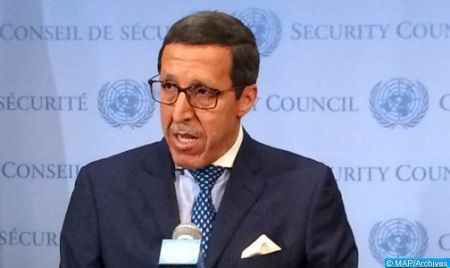Hilale to UNSG and Security Council Members: Morocanness of Sahara Strongly Reiterated in Sept. 8 Elections
The Permanent Representative of Morocco to the United Nations, Ambassador Omar Hilale, sent letters to the UN Secretary-General and the President and members of the Security Council, informing them of the general elections held on September 8 in the Kingdom, including in the Moroccan Sahara. “I am honored to inform you that September 8, 2021, was a historic day for Morocco, marked by the holding, for the first time, of general elections -legislative, communal and regional – throughout the national territory, including in the Moroccan Sahara,” said the ambassador, adding that “the voter turnout nationwide has reached 50.35%. This is a record rate compared to previous elections, despite the restrictions in place due to the Covid-19 pandemic.” Regarding the holding of these elections in the southern provinces of the Kingdom, Hilale noted that “in the Moroccan Sahara, the voter turnout rate reached 66.94% in the region of Laayoune-Sakia El Hamra and 58.30% in the region of Dakhla-Oued Ed Dahab.” He added that “at the provincial level, the voter turnout in the Moroccan Sahara was remarkable: in the Region of Dakhla-Oued Ed Dahab, the turnout reached 79.64% in the Province of Aousserd and 54.40% in the Province of Oued Ed Dahab and in the Region of Laayoune-Sakia El Hamra, the turnout recorded was 85.20% in the Province of Tarfaya, 67.37% in the Province of Es-Smara, 68.65% in the Province of Laayoune and 64.10% in the Province of Boujdour.” In this regard, the diplomat said that “the population of the two regions of the Moroccan Sahara showed great support for the general election, recording the highest voter turnout in Morocco,” stressing that “the massive participation of the population of the Moroccan Sahara in this election is a further proof, by the ballot box, of the unwavering commitment of the citizens of the Southern Provinces to their Moroccanness, as well as to the exercise of their inalienable right of democratic management of their local affairs, as part of the sovereignty and territorial integrity of Morocco.” The Moroccan diplomat also indicated that “these elections were monitored and observed, in complete independence and neutrality, by 5,020 national and international observers. This includes 4,891 national observers, including 568 observers from the National Human Rights Council (CNDH), as well as 129 international observers, representing several countries of Africa, Europe, Asia and the Arab world, international and regional organizations, national and international parliaments and non-governmental organizations and civil society.” “National and international observers have all testified to the conduct of these elections in a democratic, transparent and inclusive manner, under the procedures governing electoral processes and the highest international standards,” he noted. “These observers said that these elections were held under normal circumstances, noting that no incident likely to affect the transparency of the ballot was reported in all the regions of the Kingdom,” he concluded.

